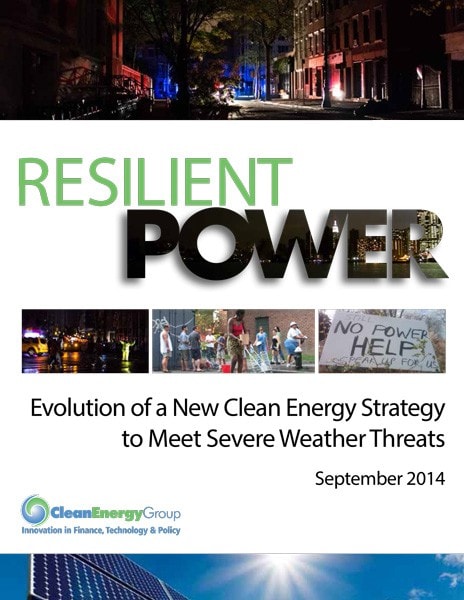Resilient Power: Evolution of a New Clean Energy Strategy to Meet Severe Weather Threats
September 18, 2014
Lew Milford, Todd Olinsky-Paul, Robert Sanders | Clean Energy Group
Clean Energy Group has released a new paper about the progress of “resilient power” efforts since the New York City blackouts in 1999 to Superstorm Sandy. The paper goes on to announce the launch of the Resilient Power Project and describes the importance of new technologies like solar PV with energy storage to provide resilient power as weather patterns become increasingly volatile and longer power outages become more frequent.
The paper, “Resilient Power: Evolution of a New Clean Energy Strategy to Meet Severe Weather Threats,” outlines the dangers that power outages can pose to our most vulnerable populations, the failures of traditional backup power sources, and the opportunities to develop distributed energy systems with clean and dependable energy technologies.
“Resilient power is a necessity in a world frequently impacted by severe weather,” said Lew Milford, Clean Energy Group President and founder of the Resilient Power Project. “For those whose lives depend on access to electricity—for life support systems, elevator access and adequate heating and cooling during extreme weather—clean energy technologies could well be the safest, most dependable power source. More resilient power is especially important to protect vulnerable populations like the elderly, the disabled and the poor.”
Clean Energy Group has a working history as a proponent of cleaner energy technologies as alternatives to diesel generators in critical facilities. It first proposed fuel cell technologies in hospitals over ten years ago, and now is looking to emerging solar + energy storage technologies to reduce impacts from outages at critical facilities such as fire and police stations, emergency shelters, and in affordable housing.
In the wake of the Superstorm Sandy, state and local officials, for the first time, have begun to make public investments in cleaner distributed energy technologies. Clean Energy Group is working with states and municipalities through the Resilient Power Project to increase public investment in these systems with efficient policies, new finance tools, and technical assistance.
The paper includes summaries of recent developments, including the New Jersey Energy Resilience Bank, Americans with Disabilities Act rulings on equal access to emergency shelters following Hurricane Sandy, Green Mountain Power’s microgrid project in Central Vermont, as well as overviews of resilient power technologies and finance tools.





